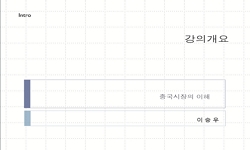Fintech has been one of the most outstanding emerging markets in the world last decade. This integration of IT-based technology and traditional banking is restructuring the individual’s financial activities as well as the banking market itself. Amon...
http://chineseinput.net/에서 pinyin(병음)방식으로 중국어를 변환할 수 있습니다.
변환된 중국어를 복사하여 사용하시면 됩니다.
- 中文 을 입력하시려면 zhongwen을 입력하시고 space를누르시면됩니다.
- 北京 을 입력하시려면 beijing을 입력하시고 space를 누르시면 됩니다.

시장 표준화 과정에서의 양의 피드백 메커니즘: 중국, 인도네시아, 한국의 Fintech 시장 사례 분석 및 시사점 = Positive Feedback Mechanism in the Formation Process of De Facto Standards: Analysis of Fintech Market Cases in China, Indonesia and Some Strategic Implications for Korean Fintech Market
한글로보기https://www.riss.kr/link?id=A107196591
- 저자
- 발행기관
- 학술지명
- 권호사항
-
발행연도
2020
-
작성언어
-
-
주제어
핀테크 ; e-Pay ; 시장표준 ; 전자결제 ; 인과순환지도 ; 양의피드백 ; 임계질량 ; 네트워크 효과 ; 네트워크 외부성 ; 전환비용 ; 규모 경제 ; 신용카드 ; 중국 ; 인도네시아 ; 한국 ; Credit Card ; MSME ; Fintech ; De facto Standard Formation ; Causal Loop Diagram ; Positive Feedback ; CriticalMass ; Network Effect ; Network Externality ; Switching Cost ; Economies of Scale ; China ; Indonesia ; Korea
-
등재정보
KCI등재
-
자료형태
학술저널
- 발행기관 URL
-
수록면
27-49(23쪽)
-
KCI 피인용횟수
0
- 제공처
-
0
상세조회 -
0
다운로드
부가정보
다국어 초록 (Multilingual Abstract)
Fintech has been one of the most outstanding emerging markets in the world last decade. This integration of IT-based technology and traditional banking is restructuring the individual’s financial activities as well as the banking market itself. Among many forms of fintech, e-Pay among other type of fintech is considered as the leading market player technology with the largest volume of market size, number of companies involved, and usage in the world. With an enormous potential, fintech affects various economies in different ways; use of fintech is being settled in some countries as de facto standards, whereas some countries like Japan and S. Korea are slow to foster it. Given the fact that Korea equips relatively well in terms of telecommunication technology, the related infrastructure, and IT-favoring culture, the slow growth of Fintech market in Korea is rather surprising. By looking into the case studies of the e-Pay markets in China, Indonesia, and Korea, this essay is to provide an macro-level analysis on ‘path-dependence’ related formation of positive feedback in the fintech markets. Then, I will point out that the formation of ‘critical mass’ is the key implication for the fintech market growth strategy in Korea in the aspect of the formation process of de facto standards.
참고문헌 (Reference)
1 장우석, "핀테크의 부상과 금융업의 변화" 현대경제연구원 1-13, 2016
2 고경일, "핀테크 산업 현황 진단과 핀테크 기업 사례 연구" 한국경영컨설팅학회 20 (20): 411-422, 2020
3 전성민, "핀테크 산업 규제와 스타트업 활성화 방안에 대한 탐색적 연구: 미국, 중국, 한국 사례를 중심으로" 한국벤처창업학회 15 (15): 45-57, 2020
4 조은영, "핀테크 모바일 간편결제 서비스 활성화 방안" 한국지능정보사회진흥원 22 (22): 22-44, 2015
5 이성훈, "핀테크 – 금융과 정보통신 기술의 융합" 한국융합학회 6 (6): 97-102, 2015
6 한지민, "중국 비현금결제의 확대가 화폐수요 및 유통속도에 미치는 영향" 중국지역학회 7 (7): 27-57, 2020
7 연태훈, "제로페이를 활용한 가맹점 결제수수료 부담 완화" 28 (28): 3-9, 2018
8 이은미, "신용카드 사용이 모바일 간편결제 이용의도에 미치는 영향에 관한 연구" 한국디지털정책학회 18 (18): 149-161, 2020
9 문태훈, "시스템다이내믹스의 발전과 방법론적 위상" 3 (3): 61-76, 2002
10 박대현, "산업 간 융합 관점에서 본 핀테크의 시사점" 한국인터넷진흥원 7 : 4-17, 2014
1 장우석, "핀테크의 부상과 금융업의 변화" 현대경제연구원 1-13, 2016
2 고경일, "핀테크 산업 현황 진단과 핀테크 기업 사례 연구" 한국경영컨설팅학회 20 (20): 411-422, 2020
3 전성민, "핀테크 산업 규제와 스타트업 활성화 방안에 대한 탐색적 연구: 미국, 중국, 한국 사례를 중심으로" 한국벤처창업학회 15 (15): 45-57, 2020
4 조은영, "핀테크 모바일 간편결제 서비스 활성화 방안" 한국지능정보사회진흥원 22 (22): 22-44, 2015
5 이성훈, "핀테크 – 금융과 정보통신 기술의 융합" 한국융합학회 6 (6): 97-102, 2015
6 한지민, "중국 비현금결제의 확대가 화폐수요 및 유통속도에 미치는 영향" 중국지역학회 7 (7): 27-57, 2020
7 연태훈, "제로페이를 활용한 가맹점 결제수수료 부담 완화" 28 (28): 3-9, 2018
8 이은미, "신용카드 사용이 모바일 간편결제 이용의도에 미치는 영향에 관한 연구" 한국디지털정책학회 18 (18): 149-161, 2020
9 문태훈, "시스템다이내믹스의 발전과 방법론적 위상" 3 (3): 61-76, 2002
10 박대현, "산업 간 융합 관점에서 본 핀테크의 시사점" 한국인터넷진흥원 7 : 4-17, 2014
11 이청아, "모바일 지갑의 가치와 지속사용의도의 영향요인 : VAM 모형을 기반으로" 한국전자거래학회 20 (20): 117-135, 2015
12 김효근, "모바일 뱅킹 시장의 동태적 구조 분석: 시스템 다이내믹스 관점" 한국정보시스템학회 15 (15): 99-124, 2006
13 이준서, "금융플랫폼 구축을 위한 핀테크 기술 및 탑재 콘텐츠에 관한 연구: 우체국 사례" 한국정보사회학회 20 (20): 31-65, 2019
14 Ozalp, H., "Why Do New Platform Technologies Fail? The Paradox of Technological Superiority" 2015
15 Monat. P., "What is Systems Thinking? A Review of Selected Literature Plus Recommendations" 4 (4): 11-26, 2015
16 최한별, "Understanding of the Fintech Phenomenon in the Beholder’s Eyes in South Korea" 한국경영정보학회 29 (29): 117-143, 2019
17 Haddad, C., "The Emergence Of The Global Fintech Market: Economic And Technological Determinants" 53 (53): 81-105, 2019
18 Gabor, D., "The Digital Revolution In Financial Inclusion: International Development In The Fintech Era" 22 (22): 423-436, 2017
19 Awasthi, R., "The Benefits of Electronic Tax Administration in Developing Economies: A Korean Case Study and Discussion of Key Challenges" 134 : 54-64, 2019
20 Katz M. L., "Systems Competition and Network Effects" 8 (8): 93-115, 1994
21 Yoon Y., "S.Korea is Slow in Adopting Fintech"
22 Liebana-Cabanillas, F. J., "Role of gender on acceptance of mobile payment" 114 (114): 220-240, 2014
23 Dat Dinh NGUYEN, "Promotion of Fintech Application for the Modernization of Banking-Finance System in Vietnam" 한국유통과학회 7 (7): 127-131, 2020
24 Arthur, W. B., "Positive feedbacks in the eonomy" 92-99, 1990
25 Evans, D. S., "Multi-sided Platforms" 1-9, 2017
26 Miao, M., "Mobile Payments in Japan, South Korea and China: Cross-border Convergence Or Divergence Of Business Models?" 40 : 182-196, 2016
27 Palfrey, J., "Interop - The Promise and Perils of Highly Interconnected Systems" Basic Books 2012
28 Drasch, B. J., "Integrating the ‘Troublemakers’: A taxonomy for cooperation between banks and fintechs" 100 : 26-42, 2018
29 Strønen, F., "Innovation capabilities in banking: The case of norwegian mobile payment" 2019
30 Shapiro. C, "Information Rules - A strategic guide to the network economy" Harvard Business School Press 1999
31 Nuyens H., "How disruptive are FinTech and digital for banks and regulators?" 12 (12): 217-222, 2019
32 Alexander, A., "How Fintech is Reaching the Poor in Africa and Asia: A Start-Up Perspective" International Finance Corporation 34 : 2017
33 Ernst, "Global FinTech Adoption Index 2019: As FinTech becomes the Norm, you need to stand out from the crowd"
34 Chen, L., "From Fintech to Finlife: the case of Fintech Development in China" 9 (9): 225-239, 2016
35 Kwon, O., "Fintech, Cryptoassets, and Central Bank Digital Currency In The Republic of Korea" Asian Development Bank Institute 1018-, 2019
36 Claessens, S., "Fintech credit markets around the world:size, drivers and policy issues" 29-49, 2018
37 Batunanggar, S., "Fintech Development And Regulatory Frameworks In Indonesia" ADBI 1-12, 2019
38 Suryanto, Rusdin, "Fintech As A Catalyst For Growth Of Micro, Small And Medium Enterprises In Indonesia" 19 (19): 1-12, 2020
39 Bank of Korea, "Financial Stability Report June 2018" BOK 2018
40 Gulamhuseinwala, I., "FinTech is gaining traction and Young, High-income Users Are The Early Adopters" 3 (3): 16-23, 2015
41 Chandra, S., "Evaluating the Role of Trust in Consumer Adoption of Mobile Payment Systems: An Empirical Analysis" 27 (27): 561-588, 2010
42 Ernst, "Ernst And Young FinTech Adoption Index 2017: the rapid emergence of FinTech"
43 Lovelock, P., "E-Government in China"
44 Farrell, J., "Dynamic Competition With Switching Costs" 19 (19): 123-137, 1988
45 Ha, J., "Consumer Valuation Of Fintech: The Case Of Mobile Payment In Korea" 2018
46 Arthur, W. B., "Competing Technologies, Increasing Returns, and Lock-In by Historical Events" 99 (99): 116-131, 1989
47 Moritz J., "Banking goes digital: The adoption of FinTech services by German Households" 34 : 2020
48 Iman, N., "Assessing the dynamics of fintech in Indonesia" 15 (15): 296-303, 2018
49 Shim Y., "Analyzing China’s Fintech Industry from the Perspective of Actor–Network Theory" 40 (40): 168-181, 2016
50 Kim, C., "An empirical examination of factors influencing the intention to use mobile payment" 26 : 310-322, 2010
51 Abdillah, L., "An Overview of Indonesian Fintech Application" 2019
동일학술지(권/호) 다른 논문
-
- 한국시스템다이내믹스학회
- 이승도 ( Lee Seungdoe )
- 2020
- KCI등재
-
시스템 다이내믹스를 활용한 자유시장경제와 조정시장경제의 비교 분석
- 한국시스템다이내믹스학회
- 윤민호 ( Minho Yoon )
- 2020
- KCI등재
-
한국사회의 자살예방을 위한 인과지도 분석연구: 노년층을 중심으로
- 한국시스템다이내믹스학회
- 김훈 ( Kim Hoon )
- 2020
- KCI등재
분석정보
인용정보 인용지수 설명보기
학술지 이력
| 연월일 | 이력구분 | 이력상세 | 등재구분 |
|---|---|---|---|
| 2026 | 평가예정 | 재인증평가 신청대상 (재인증) | |
| 2020-01-01 | 평가 | 등재학술지 유지 (재인증) |  |
| 2017-01-01 | 평가 | 등재학술지 유지 (계속평가) |  |
| 2013-01-01 | 평가 | 등재 1차 FAIL (등재유지) |  |
| 2010-01-01 | 평가 | 등재학술지 선정 (등재후보2차) |  |
| 2009-01-01 | 평가 | 등재후보 1차 PASS (등재후보1차) |  |
| 2008-01-01 | 평가 | 등재후보학술지 유지 (등재후보1차) |  |
| 2007-01-01 | 평가 | 등재후보학술지 유지 (등재후보1차) |  |
| 2005-06-29 | 학회명변경 | 한글명 : 한국시스템다이네믹스학회 -> 한국시스템다이내믹스학회영문명 : 미등록 -> Korean System Dynamics Society |  |
| 2005-01-01 | 평가 | 등재후보학술지 선정 (신규평가) |  |
학술지 인용정보
| 기준연도 | WOS-KCI 통합IF(2년) | KCIF(2년) | KCIF(3년) |
|---|---|---|---|
| 2016 | 0.55 | 0.55 | 0.55 |
| KCIF(4년) | KCIF(5년) | 중심성지수(3년) | 즉시성지수 |
| 0.56 | 0.48 | 0.599 | 0.39 |





 KISS
KISS






